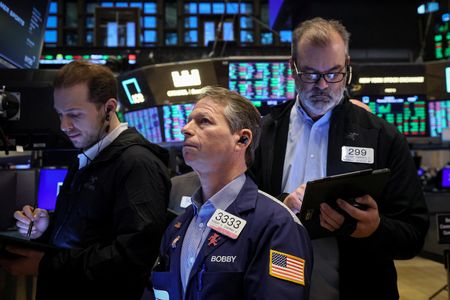By Jaspreet Singh and Max A. Cherney
(Reuters) -Chip manufacturing equipment supplier Lam Research forecast second-quarter revenue slightly below Wall Street estimates on Wednesday due to weak memory chip demand, even though its China business continues to boom.
The company’s shares fell roughly 5% in after-market trading.
The Fremont, California-based company expects current-quarter revenue of $3.7 billion plus or minus $300 million, compared with the average analyst estimate of $3.65 billion, according to LSEG data.
Flash memory-making machine sales are the weakest since the last generation of technology was widely deployed years ago, Chief Financial Officer Doug Bettinger said during an earnings call.
Large memory chip makers Samsung Electronics, SK Hynix and Micron Technology have this year cut production due to weak demand, though there are growing signs prices have bottomed.
Bettinger also said Lam’s sales were hurt by a quarter-over-quarter drop due to the “timing” of advanced chipmaking system sales.
TSMC, the world’s top contract chipmaker, in September told its major suppliers to delay the delivery of high-end chipmaking equipment, on concerns over customer demand.
Lam posted first-quarter revenue of $3.48 billion, compared with market estimates of $3.41 billion.
China constituted 48% of its first-quarter revenue compared with 30% a year earlier, the company said.
Excluding items, profit fell to $6.85 per share, compared with estimates of $6.12.
The company said it does not expect any material impacts from the updated export restrictions U.S. officials announced on Tuesday.
In a bid to block access to high-end artificial intelligence chips to China’s military, U.S. officials announced updates to export restrictions that were focused on blocking access to chipmaking tools designed to manufacture advanced AI chips.
The rules narrowed restrictions announced last year that cost Lam roughly $2 billion dollars in lost revenue.
Lam’s China business will continue to be strong in the fiscal second quarter and in the future, executives said in the conference call.
“I don’t know if China is up, down or sideways next year, but it’s not going away,” Bettinger said.
(Reporting by Jaspreet Singh in Bengaluru and Max A. Cherney in San Francisco; Editing by Sriraj Kalluvila and Jamie Freed)




